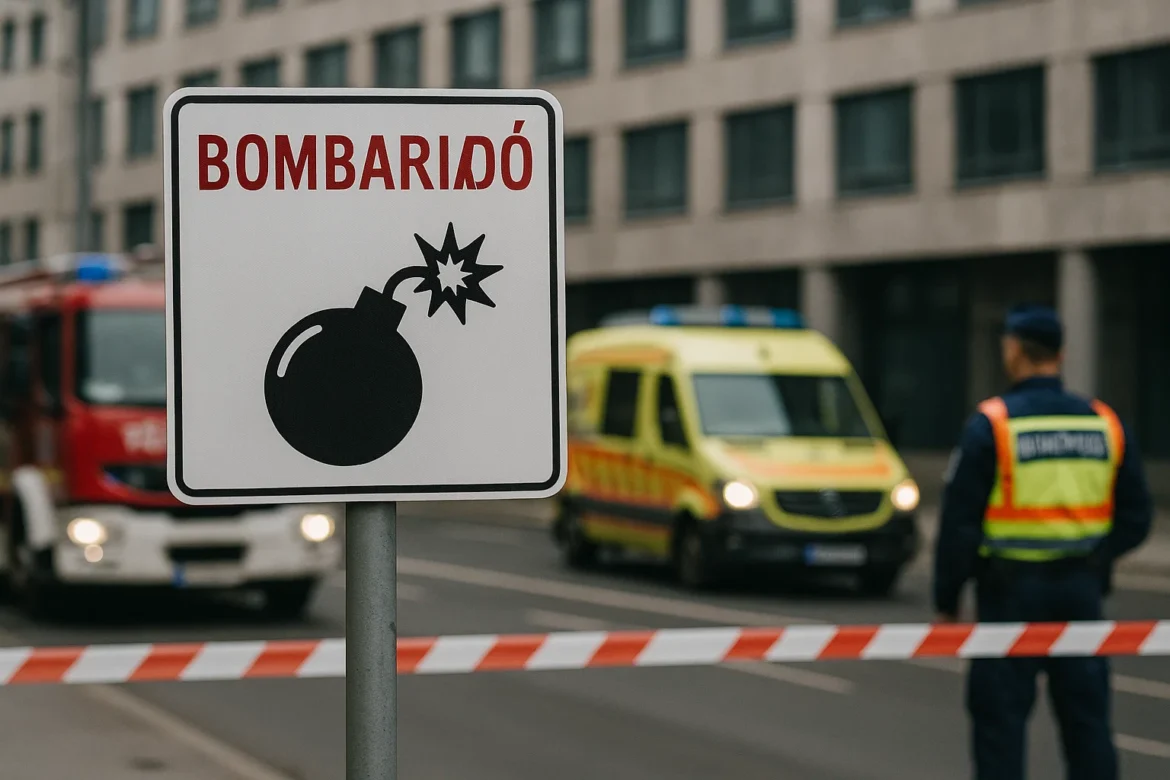
Understanding the Meaning of Bombariadó
The word bombariadó is Hungarian, and it directly translates to “bomb alert” or “bomb scare” in English. It is a term that appears in both news reports and official safety announcements across Hungary and neighboring countries when there is a suspected or confirmed threat involving an explosive device. A bombariadó does not always mean there is a real bomb; instead, it usually refers to situations where authorities receive a bomb threat or when suspicious items are discovered in public spaces. These alerts are treated with the utmost seriousness, as even a false alarm can cause major disruptions to daily life, transportation, and public safety.
The Historical Roots of Bomb Alerts
The concept of a bomb alert, or bombariadó, is not unique to Hungary. Globally, such alerts became common during the 20th century, especially after wars and during periods of political instability. Hungary, being part of Europe, has experienced both wartime and peacetime threats. In modern times, most bombariadó cases arise not from actual explosives but from prank calls or hoaxes designed to cause panic or disrupt schedules. However, history shows that even one real bomb hidden in a public area can have devastating consequences, which is why the authorities treat every bombariadó as a serious event.
Bombariadó in Schools and Educational Institutions
One of the most common settings where bombariadó occur in Hungary is within schools and universities. Authorities report that many of these alerts are prank calls made by students who wish to disrupt exams or avoid classes. Despite the childish intent, the consequences are serious. Hundreds of students and teachers may have to evacuate the building, police units are dispatched, and bomb squads investigate the premises. Even if no bomb is found, the disruption to the educational process is significant. Over time, Hungarian law enforcement agencies have become stricter in punishing those responsible for false bombariadó cases in schools.
Bombariadó in Public Transportation Systems
Public transport systems, such as train stations, airports, and metro lines, are among the most vulnerable targets for potential bomb threats. In Hungary, the term bombariadó often makes headlines when Budapest’s international airport or central train stations are evacuated due to a suspected device. These incidents cause thousands of passengers to be delayed, flights to be postponed, and significant economic losses for transportation companies. Authorities have developed detailed emergency protocols to respond to such threats quickly, thereby minimizing risks to passengers and ensuring thorough investigations.
The Psychological Impact of a Bombariadó
A bombariadó does not only disrupts physical spaces; it also leaves a lasting psychological mark on the people involved. For individuals who experience an evacuation or are caught in the middle of a sudden alarm, feelings of fear, uncertainty, and anxiety can linger. Children may develop stress responses, employees may feel unsafe at work, and frequent travelers may become nervous in public spaces. Even if the bombariadó turns out to be a false alarm, the psychological weight of the possibility of danger is heavy. This impact is why governments and organizations invest in public education campaigns that emphasize the importance of staying calm and following instructions during emergencies.
False Bombariadó and Legal Consequences
A growing problem in Hungary and other parts of Europe is the number of false bombariadó cases. These are often carried out by pranksters who may not understand the full scope of the consequences. However, Hungarian law treats these cases very seriously. Making a false bomb threat is considered a criminal offense that can lead to imprisonment, hefty fines, and a permanent criminal record. Authorities also make use of advanced technologies to trace the source of anonymous calls and digital threats, ensuring that perpetrators are held accountable.
Bombariadó and Counter-Terrorism Preparedness
 Although many bombariadó incidents are hoaxes, the possibility of a real attack cannot be ignored. For this reason, Hungarian counter-terrorism units and police forces treat every threat as potentially real. The Counter Terrorism Centre (TEK) in Hungary plays a vital role in responding to bomb threats, ensuring swift evacuations, bomb disposal, and communication with the public. These procedures are part of broader counter-terrorism preparedness measures that align with European Union security standards. The term bombariadó has therefore become a critical part of the country’s modern security vocabulary.
Although many bombariadó incidents are hoaxes, the possibility of a real attack cannot be ignored. For this reason, Hungarian counter-terrorism units and police forces treat every threat as potentially real. The Counter Terrorism Centre (TEK) in Hungary plays a vital role in responding to bomb threats, ensuring swift evacuations, bomb disposal, and communication with the public. These procedures are part of broader counter-terrorism preparedness measures that align with European Union security standards. The term bombariadó has therefore become a critical part of the country’s modern security vocabulary.
Media Coverage of Bombariadó
In today’s digital era, news of a bombariadó spreads quickly through television, online portals, and social media. While media coverage is necessary to inform the public, it also has the side effect of amplifying fear. For this reason, Hungarian media outlets are encouraged to report responsibly, providing verified information rather than sensational headlines. Citizens rely on accurate updates during a bombardment, and misleading reports can worsen panic. The balance between informing the public and preventing mass hysteria is delicate but essential.
Bombariadó in the Digital Age
The rise of digital communication has influenced the way bombariadó situations are reported and handled. Threats can now be made through emails, social media platforms, or anonymous messaging apps. This makes it easier for pranksters or malicious actors to spread fear without being physically present. However, digital forensics and cybercrime divisions are increasingly skilled at tracking down online perpetrators. On the other hand, digital tools also allow faster alerts and real-time communication with the public, enabling people to respond quickly to evacuation orders or safety instructions.
Comparing Bombariadó to Global Bomb Alert Systems
While bombariadó is a Hungarian term, the phenomenon exists worldwide. In the United States, the United Kingdom, and other European nations, bomb alerts follow a similar protocol: evacuation, police response, bomb squad investigation, and public communication. However, cultural differences influence how citizens respond. For example, in countries with a long history of terrorism, people may be more accustomed to frequent alerts, whereas in countries with fewer threats, a single bomb attack can cause widespread panic. Hungary sits somewhere in between, with periodic alerts that remind citizens of the importance of vigilance.
Economic Impact of Bombariadó Events
Beyond fear and disruption, a bombariadó carries significant economic costs. Businesses lose revenue when offices or shopping centers must be evacuated. Transportation hubs suffer financial damage from delays and cancellations. Police forces and emergency services dedicate extensive resources to managing each case, diverting manpower from other pressing duties. Even if no bomb is found, the combined economic toll of a single bombardment can reach into the millions of forints. Over the course of a year, multiple false alerts can accumulate into a serious financial burden for the government and private companies alike.
Public Safety Education During Bombariadó
Authorities emphasize the importance of public cooperation during a bombariadó. In Hungary, schools, workplaces, and public venues are required to hold periodic evacuation drills to prepare people for emergencies. These drills teach individuals how to leave buildings calmly, avoid panic, and follow official instructions. Educational campaigns also highlight the dangers of making false bomb threats, reminding citizens that a bomb threat is not a game. By raising awareness, governments aim to reduce both panic and prank-related disruptions.
Technological Tools in Handling Bombariadó
Modern technology plays an essential role in managing bombariadó cases. Surveillance systems, bomb-sniffing dogs, X-ray machines, and advanced scanners are all used to detect suspicious items. Artificial intelligence tools can even help police analyze threat patterns and predict possible hoaxes. Additionally, mass notification systems send alerts to citizens’ phones, providing instant instructions during a bombardment. Technology ensures a faster and more precise response, helping authorities balance caution with efficiency.
Case Studies of Notable Bombariadó Incidents in Hungary
Over the years, Hungary has seen several high-profile bombariadó cases that captured national attention. For example, large shopping centers in Budapest have been evacuated due to anonymous threats, causing thousands of shoppers to be displaced. The international airport has also faced bomb threats that led to widespread flight cancellations. Each case highlights the disruptive power of a single phone call or email, as well as the readiness of Hungarian authorities to protect citizens. These examples serve as reminders of the importance of preparedness and vigilance.
Bombariadó and the Role of Community Cooperation
A successful response to a bombariadó relies not only on authorities but also on the cooperation of ordinary citizens. People are encouraged to report suspicious items, follow evacuation protocols, and avoid spreading unverified rumors on social media. Panic and misinformation can worsen the effects of a bombardment, while calm and collective action can save lives. Communities that remain aware and cooperative are better equipped to handle these emergencies without unnecessary chaos.
Future Challenges in Managing Bombariadó
Looking ahead, the concept of bombariadó will continue to evolve as threats and technologies change. As societies become more dependent on digital communication, online threats will rise. At the same time, advanced detection tools and predictive technologies will improve responses. One of the biggest challenges will be balancing civil liberties with public safety, especially when surveillance and data collection are used to prevent bomb attacks. Governments, law enforcement agencies, and citizens will need to work together to adapt to these new realities.
Conclusion
The term bombariadó may appear simple, but it represents a complex reality involving safety, psychology, economics, and law. While many cases in Hungary turn out to be false alarms, each bombariadó is treated as a potential danger that demands immediate and serious response. From schools to airports, from pranksters to counter-terrorism units, the ripple effects of a bombardment are wide-reaching. Understanding this concept not only sheds light on Hungarian society but also connects to global concerns about public safety in an unpredictable world.
Als0 Read: Novafork


